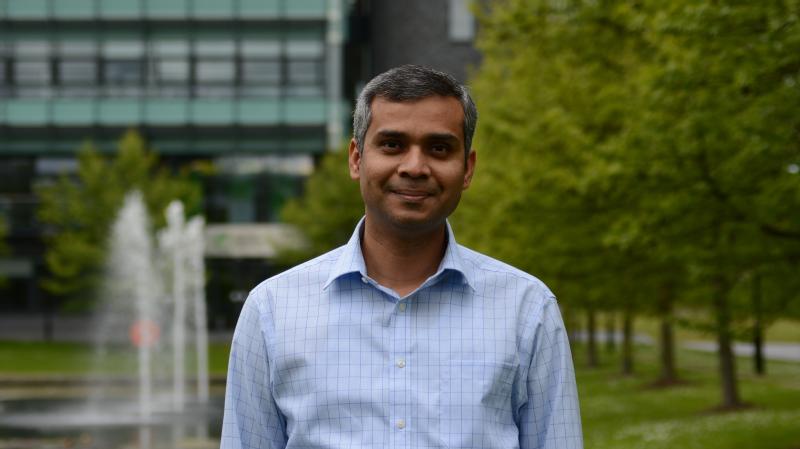Computer Science News
Ranko Lazic appointed Leverhulme Research Fellow
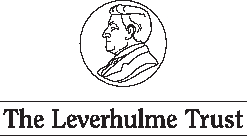 Dr Ranko Lazic has been awarded a Leverhulme Research Fellowship for the 2017/18 academic year, to work on the Petri nets reachability conjecture.
Dr Ranko Lazic has been awarded a Leverhulme Research Fellowship for the 2017/18 academic year, to work on the Petri nets reachability conjecture.
Petri nets, also known as vector addition systems, are one of the most prominent models of concurrency, and their study is a vibrant research area. They have been used to discover bugs and eliminate vulnerabilities in network protocols, concurrent software, business processes, hardware circuits, and control systems.
Professor Artur Czumaj, head of the Foundations of Computer Science research group, has commented:
This prestigious fellowship will further strengthen the internationally leading research in theoretical computer science at Warwick, which recently has been also greatly boosted by the new permanent appointments of Dr Sayan Bhattacharya and Dr Dmitry Chistikov.
Dmitry Chistikov joins the Department as a new Assistant Professor
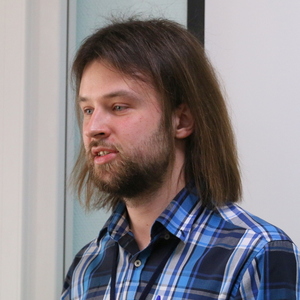 The Department is welcoming our new Assistant Professor Dmitry Chistikov, who will be associated with the Division of Theory and Foundations (FoCS) and the Centre for Discrete Mathematics and its Applications (DIMAP).
The Department is welcoming our new Assistant Professor Dmitry Chistikov, who will be associated with the Division of Theory and Foundations (FoCS) and the Centre for Discrete Mathematics and its Applications (DIMAP).
After obtaining his Candidate of Sciences (equivalent to PhD) degree at the Department of Computational Mathematics and Cybernetics of Moscow State University, Dmitry was a postdoctoral researcher at the Max Planck Institute for Software Systems, as wel as at the University of Oxford.
The general area of Dmitry's research is theoretical computer science. In particular, he is interested in theoretical foundations of verification: its algorithmic aspects (decision and counting problems) as well as combinatorial aspects (extremal properties and characteristics of mathematical models of computation).
For more information about Dmitry's research, please see his web page.
Graham Cormode awarded 2017 Adams Prize
Professor Graham Cormode has been awarded the 2017 Adams Prize by the Cambridge Faculty of Mathematics. The award recognizes his work on "Statistical Analysis of Big Data", and is awarded jointly with Professor Richard Samworth of Cambridge. Professor Cormode says,
My work, in common with Prof Samworth's, is about finding mathematical representations of data that allow useful information to be extracted effectively and accurately. These techniques allow ever larger quantities of data to be handled on ordinary computers.
Professor Cormode's work on "data sketches" has been used in companies such as Netflix, Yahoo, Twitter, Google, AT&T and Sprint. He is currently leading Warwick's involvement in the Alan Turing Institute at London, and working on questions to do with verification of machine learning, and privacy.
Sylvain Schmitz visits as IAS Residential Fellow
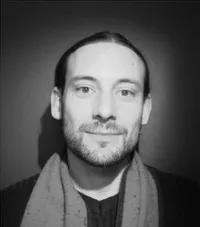 As a Residential Fellow of Warwick's Institute of Advanced Study, Dr Sylvain Schmitz is visiting the department 20-24 March 2017, for collaborative research with Dr Ranko Lazic and other members of DIMAP.
As a Residential Fellow of Warwick's Institute of Advanced Study, Dr Sylvain Schmitz is visiting the department 20-24 March 2017, for collaborative research with Dr Ranko Lazic and other members of DIMAP.
Schmitz (PhD University of Nice - Sophia Antipolis 2007) is an Assistant Professor at ENS Paris-Saclay and a permanent member of LSV, one of the top European research centres in logical aspects of computer science. In 2015, Schmitz was a Leverhulme Visiting Professor at Warwick. An author of over 40 articles in international journals and conferences, Schmitz's work has attracted over 500 citations, won best-paper awards, and been presented at several invited talks and European doctoral schools.
Sayan Bhattacharya joins the Department as a new Assistant Professor
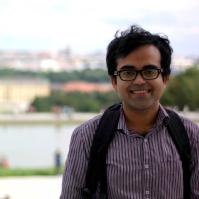
The Department is welcoming our new Assistant Professor Sayan Bhattacharya, who will be associated with the Division of Theory and Foundations (FoCS) and the Centre for Discrete Mathematics and its Applications (DIMAP).
Sayan obtained his PhD in Computer Science from Duke University (USA) in 2012. Then he did his postdoc at Max Planck Institute for Informatics, Saarbrücken (Germany) and at University of Vienna (Austria). From October, 2014 till February, 2017, he was a faculty member at the Institute of Mathematical Sciences, Chennai (India).
He works in theoretical computer science. Specifically, his research interests are in dynamic graph algorithms, data structures, online algorithms, streaming algorithms, and algorithmic game theory.
For more information about Sayan's research please see his web page at https://www.imsc.res.in/~bsayan/.
New collaborative project on parity games
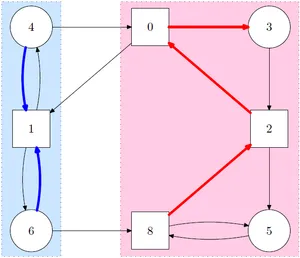
Dr Marcin Jurdzinski and Dr Ranko Lazic from Warwick's DIMAP inter-disciplinary centre and the Computer Science department, jointly with Dr Sven Schewe, Dr John Fearnley and Dr Dominik Wojtczak from the University of Liverpool, will lead a new research project on solving parity games in theory and practice, to run 2017-2020.
The project will be supported by approx. £750K from the EPSRC across the two sites. The proposal was ranked top at its funding prioritisation panel, and the reviewers said:
This is the strongest and best designed proposal on theoretical computer science I have seen in the last five years.
as well as
The proposal is about fundamental research, but there is a clear path connecting the expected results to concrete industrial needs on program verification and program synthesis.
Professor Artur Czumaj, head of DIMAP and of the Theory and Foundations research division, commented:
This exciting new EPSRC project builds on excellence in theoretical computer science for which Warwick is internationally renowned. It strengthens our collaborative links with Computer Science at Liverpool, who were likewise one of the leading departments for research outputs in the most recent REF.
University contributing to new advances in cancer diagnosis
A University of Warwick computer scientist is working with technology that could revolutionise how some cancers are diagnosed.
A high-tech computer system is able to read samples of human tissue and aid pathologists in the identification of minute changes in cells that can indicate cancer is present. More than 10,000 slides were examined in the first phase of the study[1] which shows that pathologists are as good at accurately diagnosing cancer on a computer as they are with a microscope.
Now Professor Nasir Rajpoot is working with University Hospitals Coventry and Warwickshire NHS Trust (UHCW) to develop the next generation of image analytics to use with this technology.
The ground breaking technology has the power to help pathologists grade some types of tumours, including lung, prostate and bladder tumours with precision. In prostate cancer, for example, this could make the difference between someone being offered surgery rather than drug based treatments.
The computer system known as The Omnyx® Precision Solution™, can help pathologists to see the small differences in cells in the same way that they have currently been using a microscope, allowing them to make sound decisions on many aspects of cancer diagnosis.
UHCW is the first in the UK to introduce this kind of innovation to its routine practice, meaning it is already benefitting patients.
The Omnyx system digitises slides which are traditionally placed on a microscope so that pathologists can look at them on a computer. Once on the computer, the UHCW scientists have written programmes which will separate normal from abnormal samples.
Consultant pathologist David Snead said:
“I am delighted that University Hospital, Coventry has led this ground breaking study. This provides even greater evidence that digital pathology really works, and works well. The introduction of digital pathology has fantastic potential benefits for patients. We can expect to be able to read samples more quickly than before, and the big advantage is that we can use the computer to easily manipulate an image or its data. For some patients, this additional information may change how their disease is managed.”
Mamar Gelaye, CEO of Omnyx noted:
“Dr Snead and his team have made a significant contribution to showing the value of digital pathology for both clinicians and patients. We are only at the beginning of harnessing the benefits of digitising pathology services, and we look forward to working with institutions like University Hospitals Coventry and Warwickshire NHS Trust to achieve even greater progress in delivering more accurate and efficient cancer diagnoses.”
Dr Rajpoot said:
“This is a very exciting development in the field of digital pathology. What it means is that we can now move forward with the application of digital pathology image analysis algorithms in a clinical setting. For instance, computer algorithms can automate the process of detecting normal samples so that some routine cases will not need to be looked at by a pathologist at all.
“Together with the team at UHCW, we are looking forward to developing technologies for computer-assisted diagnosis and image analytics for discovering biologically meaningful and clinically relevant signatures of cancer.”

